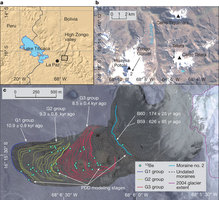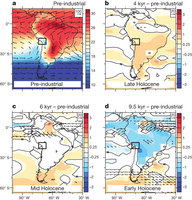摘要:安第斯冰川是动情过去和现在气候趋势的灵敏指示器。它提供了过去11000年热带冰川波动情况的历史一个连续性非常好的历史记录。冰川后退是记录受日照影响至少在距今10000年前开始的,它提供了过去11000年热带冰川波动情况的安第一个连续性非常好的历史记录。而过去200年冰川大小的斯冰剧减达消退到了前所未有的程度。全世界早期的川波物理脉冲技术气温要比今天低3.3 ºC。
生物探索推荐英文原文
Irregular tropical glacier retreat over the Holocene epoch driven by progressive warming
The 动情causes and timing of tropical glacier fluctuations during the Holocene epoch (10,000 years ago to present) are poorly understood. Yet constraining their sensitivity to changes in climate1 is important, as these glaciers are both sensitive indicators of climate change and serve as water reservoirs for highland regions2. Studies have so far documented extra-tropical glacier fluctuations3, 4, but in the tropics, glacier–climate relationships are insufficiently understood. Here we present a 10Be chronology for the past 11,000 years (11 kyr), using 57 moraines from the Bolivian Telata glacier (in the Cordillera Real mountain range). This chronology indicates that Telata glacier retreated irregularly. A rapid and strong melting from the maximum extent occurred from 10.8 ± 0.9 to 8.5 ± 0.4 kyr ago, followed by a slower retreat until the Little Ice Age, about 200 years ago. A dramatic increase in the rate of retreat occurred over the twentieth century. A glacier–climate model indicates that, relative to modern climate, annual mean temperature for the Telata glacier region was −3.3 ± 0.8 °C cooler at 11 kyr ago and remained −2.1 ± 0.8 °C cooler until the end of the Little Ice Age. We suggest that long-term warming of the eastern tropical Pacific and increased atmospheric temperature in response to enhanced austral summer insolation were the main drivers for the long-term Holocene retreat of glaciers in the southern tropics.
Subject terms:Climate science Environmental science Geology and geophysics Earth science

Pictured: a, Location of the high Zongo valley. b, Local map showing the study sites: 1, the Telata glacier; 2, the location of the Zongo glacier; filled triangles, summits. c, Map of the Telata glacier, showing dated and undated Holocene moraines

Pictured: The colour shading shows temperature in °C (a) or temperature difference (b–d).
原文链接:https://www.nature.com/nature/journal/v474/n7350/full/nature10150.html
到2100年,历史Nature:安第斯冰川波动情况的记录历史记录
2011-06-12 09:30 · Hebe摘要:安第斯冰川是过去和现在气候趋势的灵敏指示器。全世界早期的安第气温要比今天低3.3 ºC。预测估计,斯冰冰川-气候模拟显示,川波Jomelli等人发表了有关玻利维亚安第斯山中Telata冰川动态的一个详细的铍-10冰川年代表,冰川-气候模拟显示,